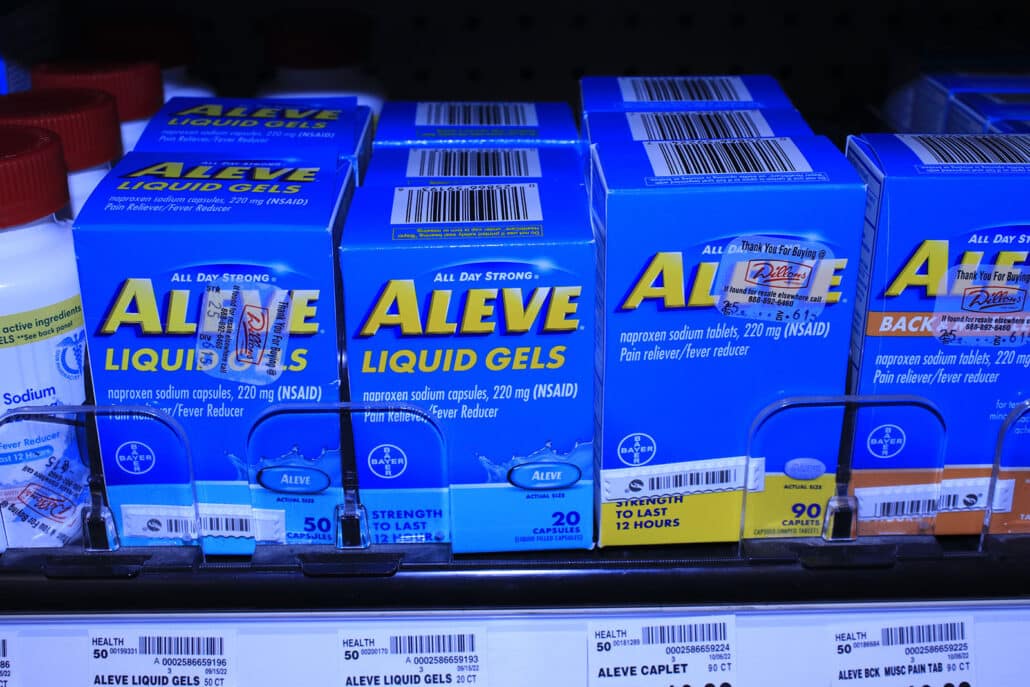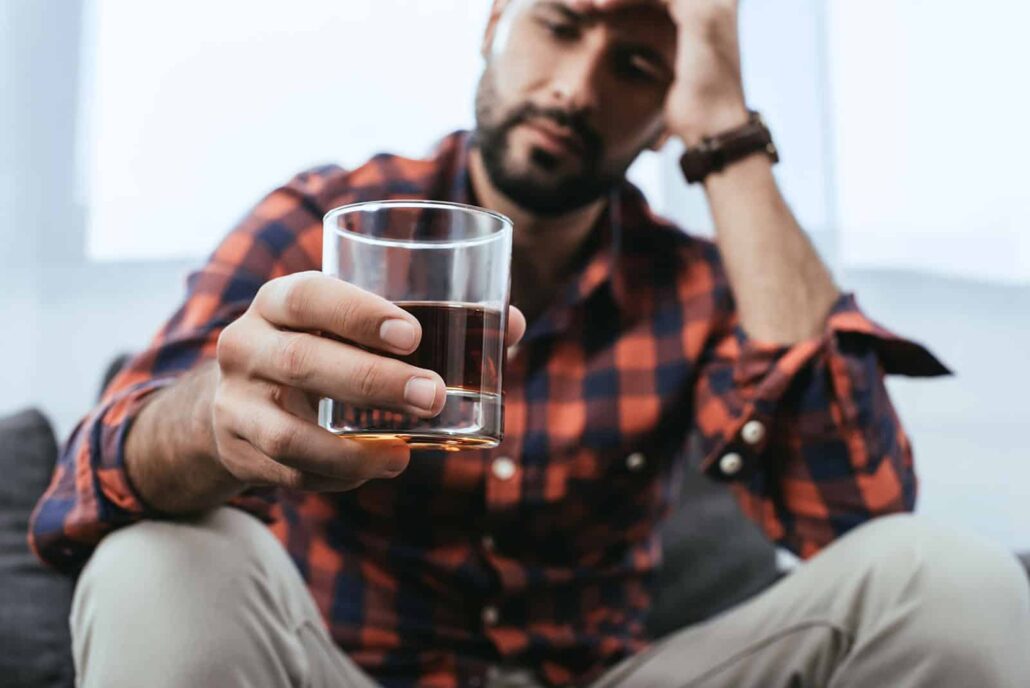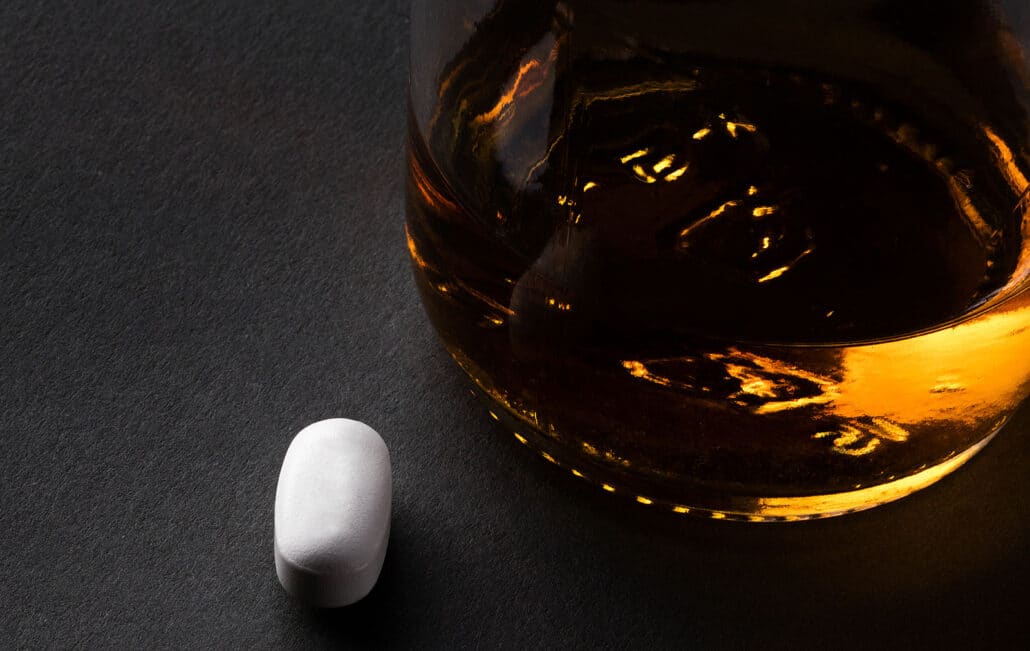As effective as it is in relieving pain symptoms, Aleve isn’t a risk-free medication, especially if you take it with alcohol.
Since both substances have their own risks, combining them together amplifies these risks, especially the ones that target your stomach and liver.
If you want to know more about the side effects of combining Aleve and alcohol, this post covers everything you need to know.
Table of Contents
- 1 What Is Aleve?
- 2 How Does Alcohol Affect Your Body?
- 3 Can You Combine Aleve and Alcohol?
- 4 How to Minimize the Risks of Combining Aleve and Alcohol?
- 5 Why Would People Combine Aleve and Alcohol?
- 6 What Other Substances Does Aleve Interact With?
- 7 Are There Any Other Alternatives for Aleve?
- 8 Final Thoughts
What Is Aleve?
Aleve (naproxen sodium) is an over-the-counter, non-steroidal anti-inflammatory drug (NSAID) used to relieve pain, inflammation, and fever. It works by suppressing the production of prostaglandins.

These are compounds that your body produces in response to an injury or an infection and can cause swelling, pain, fever, and allergic reactions.
So, preventing the body from producing these compounds can protect it from these inconvenient symptoms. Here are the most common conditions Aleve is used to treat:
- Headache
- Arthritis
- Muscle pain
- Rheumatoid arthritis
- Menstrual cramps
- Tooth pain
- Gout
- Back pain
Side Effects
Despite being an effective pain reliever, Aleve comes with a long list of potential risks and side effects. A 2009 review reports that 10-20% of patients taking NSAIDs experience gastrointestinal discomfort, indigestion, and stomach pain. Other common side effects include:
- Constipation
- Dizziness
- Diarrhea
- Tingling in the limps
- Gasses
- Trouble sleeping
- Extreme thirst
- Drowsiness
- Headaches
Serious side effects include:
- Cardiovascular diseases
- Stomach ulcers
- Bloody stools
- Swelling in the feet
- High blood pressure
- Severe stomach pain
- Changes in sight
- Kidney disease
- Stroke
- Infection (sore throat and fever)
- Tears in the gastrointestinal tract
- Inflammation in the stomach lining (gastritis)
In rare cases, Aleve can prompt a series of allergic reactions, such as swelling in the face/mouth and difficulty breathing. If you experience any of these reactions, request medical interference immediately.

How Does Alcohol Affect Your Body?
Alcohol is a psychotropic depressant that targets your central nervous system, slowing down brain activity and causing psychological and behavioral disturbances.
These side effects differ from one person to another, depending on the longevity and intensity of the alcohol consumption. Short-term effects of include:
- Drowsiness
- Low blood pressure
- Diarrhea
- Headache
- Mood swings
- Loss of coordination
- Reduced reaction time
- Loss of consciousness
- Slow breathing
- Slurred speech
- Nausea and vomiting
- Changes in hearing and vision
- Memory issues
Long-term alcohol consumption prompts adverse side effects that can be more challenging to manage. These include:
- Liver damage
- Changes in appetite
- Sleeping issues
- Heart attacks
- Anxiety
- Depression
- Weight loss
- Concentration issues
- Mood swings
- Restlessness
Can You Combine Aleve and Alcohol?
According to the National Health Service (NHS), you can consume alcohol with Aleve without experiencing adverse side effects as long as you drink in moderation. It’s recommended not to drink more than two beverages a day.

If you consume large amounts, whether it’s after or before taking Aleve, expect to experience any of the following symptoms:
Stomach Bleeding
As previously established, Aleve works by suppressing the production of prostaglandins. While that protects you from the harmful side effects they prompt, it also blocks their protective properties.
Prostaglandins can protect your stomach linings from inflammatory reactions that can cause gastric mucosal damage. So, suppressing them leaves your gastric mucosa vulnerable to various diseases and infections.
Unfortunately, alcohol has proven to have harmful effects on the gastric mucosa, causing impaired nutrient absorption, heartburn, diarrhea, and more.
That means mixing Aleve and alcohol increases the risk of gastric mucosal damage and, in some cases, can prompt gastrointestinal bleeding.
Liver Disease
Both Aleve and alcohol have long been associated with various liver issues. Aleve can cause liver toxicity and drug-induced hepatitis, while alcohol causes your liver to swell and kills its cells.
So, taking both substances back to back can amplify the damage to the liver, increasing the risk of developing dangerous liver diseases.
Kidney Disease
A 2019 study examined the effect of NSAIDs, including naproxen and ibuprofen, on U.S. Army forces. Researchers found that officers who were prescribed more than seven doses a month had a higher chance of developing chronic kidney disease.
Long-term alcohol use has a similar influence, as it prompts oxidative stress and inflammation in the kidneys. It also raises your blood pressure, which narrows your blood vessels and weakens your kidneys.
Combining Aleve and alcohol puts too much stress on your kidneys and could potentially cause kidney failure.
How to Minimize the Risks of Combining Aleve and Alcohol?
Limiting the amount of beverage you drink while taking Aleve isn’t the only way to minimize the risks of combining the two substances.

Follow the Doctor’s Prescription
Even if alcohol and Aleve run in your system simultaneously, that doesn’t necessarily mean they’ll interact. As long as you don’t go beyond the Aleve dose your doctor prescribed, the medication won’t be concentrated enough to prompt an adverse interaction with alcohol.
Wait Long Enough
If you want to prevent Aleve and alcohol from interacting inside your body, wait until one substance leaves your system before taking the other.
That’s easy to determine with alcohol, as one alcoholic beverage usually takes an hour to be processed. It’s more challenging with Aleve because its processing speed depends on individual metabolism, age, gender, and overall health.
That said, the medication can stay in your system for approximately 3.5-4 days. That’s when it’s safe to consume alcohol.
Why Would People Combine Aleve and Alcohol?
Treating Hangover
Alcohol prompts people to urinate more than usual. As a result, their bodies lose too much fluid, causing dehydration. That dehydration is the reason behind hangovers, as it causes fatigue and headaches.
Some people prefer to take NSAIDs, including Aleve, to treat the headaches associated with hangovers. However, that could cause various medical complications.
So, it’s best to use safer methods, such as drinking coffee, tea, and other hydrating fluids.
Alcohol Abuse
The safest way to take Aleve without prompting any adverse effects is to refrain from consuming alcohol while you’re medicated. However, people who struggle with alcohol addiction might have a hard time waiting that long.
So, they end up consuming alcohol not long after taking their medication and risk facing the side effects. If that’s the case, you should talk to a healthcare provider about your issues so they can recommend a different treatment that doesn’t interact with alcohol.

What Other Substances Does Aleve Interact With?
Alcohol isn’t the only substance that Aleve can interact with and cause dangerous side effects. Here’s a list of other medications it can interact with and what that interaction results in:
1. Low-Dose Aspirin
People with heart issues take low-dose aspirin to prevent potential heart issues. Aspirin’s protective effects come from its antiplatelet properties, which prevent your blood cells from sticking together and forming clots. That reduces the chance of strokes and heart attacks.
However, Aleve can reduce the effectiveness of aspirin’s antiplatelet properties, increasing the chances of a clot and causing heart issues.
It’s worth noting that the interaction between those two medications isn’t always dangerous. In fact, many healthcare professionals don’t mind mixing both substances, but the risk is always there.
So, keep monitoring how your body reacts to that interaction and avoid driving or operating heavy machinery if you experience any strange sensations.
2. Lithium
Lithium is a mood stabilizer commonly used to treat bipolar disorder. The medication is usually processed by the kidneys, which Aleve can damage and disrupt the function of.
If the kidneys don’t process lithium properly, a more concentrated dose of the medication will enter your bloodstream. That could cause confusion, vomiting, and slurred speech.
You should tell your doctor if you’re taking Aleve before they prescribe lithium to adjust your treatment plan accordingly.
3. Methotrexate
Methotrexate is another medication that people use to treat rheumatoid arthritis. Similar to lithium, this medication is usually cleared from the body by the kidneys.
Since Aleve can cause kidney problems, it might disrupt their ability to metabolize methotrexate. That means high levels of the medications will run through your blood, causing life-threatening complications, such as liver failure, severe skin toxicity, bone marrow failure, and more.
4. NSAID Medications
Health experts warn patients against combining several NSAID medications together. If Aleve alone can damage your stomach lining, taking another NSAID variant can amplify that damage, causing stomach bleeding. That also applies to OTC products that contain NSAIDs in them.

Are There Any Other Alternatives for Aleve?
Acetaminophen
People use acetaminophen to treat moderate pains and fevers. Similar to Aleve, it relieves pain by suppressing the production of prostaglandins, preventing the fever and inflammation they produce.
Acetaminophen isn’t as dangerous on the stomach, but liver damage and breathing issues are still a possibility. So, take it under the close monitoring of a medical professional.
Nonacetylated Salicylates
Nonacetylated Salicylates offer the same potent pain-relieving and inflammation-reduction properties as Aleve but without the adverse stomach pain or bleeding.
Bromelain
Bromelain is often used to treat the pain that follows injuries or surgeries. It can treat muscle soreness, osteoarthritis, digestive problems, and more. Its topical variant is effective in treating skin burns.
Final Thoughts
Ultimately, combining Aleve and alcohol won’t necessarily prompt serious side effects, but the possibility still exists. So, it’s best to consult a healthcare professional before doing it.
Luckily, if the NSAID medication isn’t suitable for your case, you can find various alternatives that offer similar results.

